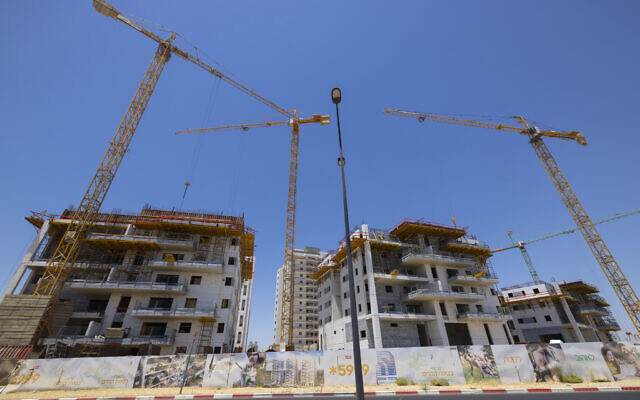Israel swings to budget deficit in March as state revenues from taxes fall
For the first time in nine months, Israel posts a budget deficit – of NIS 300 million, or 0.01% of GDP, due partly to a 43% drop in revenue from real estate taxes, says Treasury
Sharon Wrobel is a tech reporter for The Times of Israel.

For the first time after nine months, Israel posted a budget deficit, of NIS 300 million ($82 million), or 0.01% of GDP in March over the prior 12 months, as state revenue from taxes declined, according to preliminary figures released by the country’s Finance Ministry on Sunday.
The Finance Ministry said the deficit is fueled by a downward trend in state revenues following the “exceptionally high increase in state revenues” in 2022. In March, state revenues declined 4.7% to NIS 40.8 billion versus NIS 42.8 billion during the same month last year. Government expenditure stood at NIS 43.5 billion in March, compared with the NIS 41.9 billion in March 2022.
Although the March deficit is minimal in terms of the percentage of GDP, it comes during a period when Israel’s robust economic growth of more than 6% in 2022 is already expected to moderate and slow to around 2.5% this year. Senior Finance Ministry officials have warned that the government’s proposed judicial overhaul could result in a severe loss of tax revenue and do “very significant harm” to the economy.
In March, revenues generated from total taxes amounted to NIS 34.3 billion, compared with NIS 36.4 billion in the corresponding period last year. Revenue from direct taxes fell 8% to about NIS 20 billion. The most significant drop was in the collection of real estate taxes, which slumped 43% to NIS 1.5 billion, as Israel’s booming housing market is showing signs of a slowdown amid a higher interest-rate environment.
Figures released by the Central Bureau of Statistics on April 14 showed that Israel’s housing market saw prices fall for the first time since 2020. Home prices fell 0.2% in January-February 2023 when compared to prices from a month earlier, according to CBS data.
Housing prices had rocketed over the past two years, as the coronavirus pandemic faded, along with rampant inflation at home and abroad. In December, the statistics bureau said home prices were 20% higher in September-October 2022 than a year earlier; that figure has now fallen to 12.7% when comparing January-February to the same period in 2022.

Corporate tax revenue declined 6% in March year-on-year and income from the collection of value-added-taxes dropped 20% to NIS 9.7 billion, partly due to a slowdown in consumption, according to data released by the Israel Tax Authority.
In the first three months of the year, state revenues decreased by 4.4% to an accumulative NIS 120.7 billion, compared to the corresponding period in 2022, while government expenditures increased to NIS 106.6 billion versus NIS 102.1 billion. As state revenues exceeded expenditures, it created an accumulative surplus of NIS 14.1 billion since the beginning of the year compared with a surplus of NIS 24.1 billion during the same period in 2022.
That is after the government in 2022 posted the first budget surplus in 35 years of 0.6% of GDP as state revenues rose 4.8% to NIS 468.5 billion, and exceeded total expenditure of NIS 458.8 billion.
For this year, the Finance Ministry targets budget deficits of 0.9% in 2023 and 0.8% of GDP in 2024. Israel posted deficits of 4.4% of GDP in 2021 and 11.3% in 2020 as the government introduced a NIS 196.3 billion multi-year economic aid spending plan to help the economy deal with the coronavirus pandemic.
In late March, the Knesset approved in its first reading the state’s 2023-2024 budget. It is currently under discussion at the Knesset Finance Committee. Prime Minister Benjamin Netanyahu’s government has until May 29 to successfully complete the two remaining budget votes on the Knesset floor or risk automatically triggering the government’s collapse. The budget presented by the government allocates NIS 484.8 billion in spending for 2023 and NIS 513.7 billion in 2024, up from NIS 452.5 billion in 2022.









